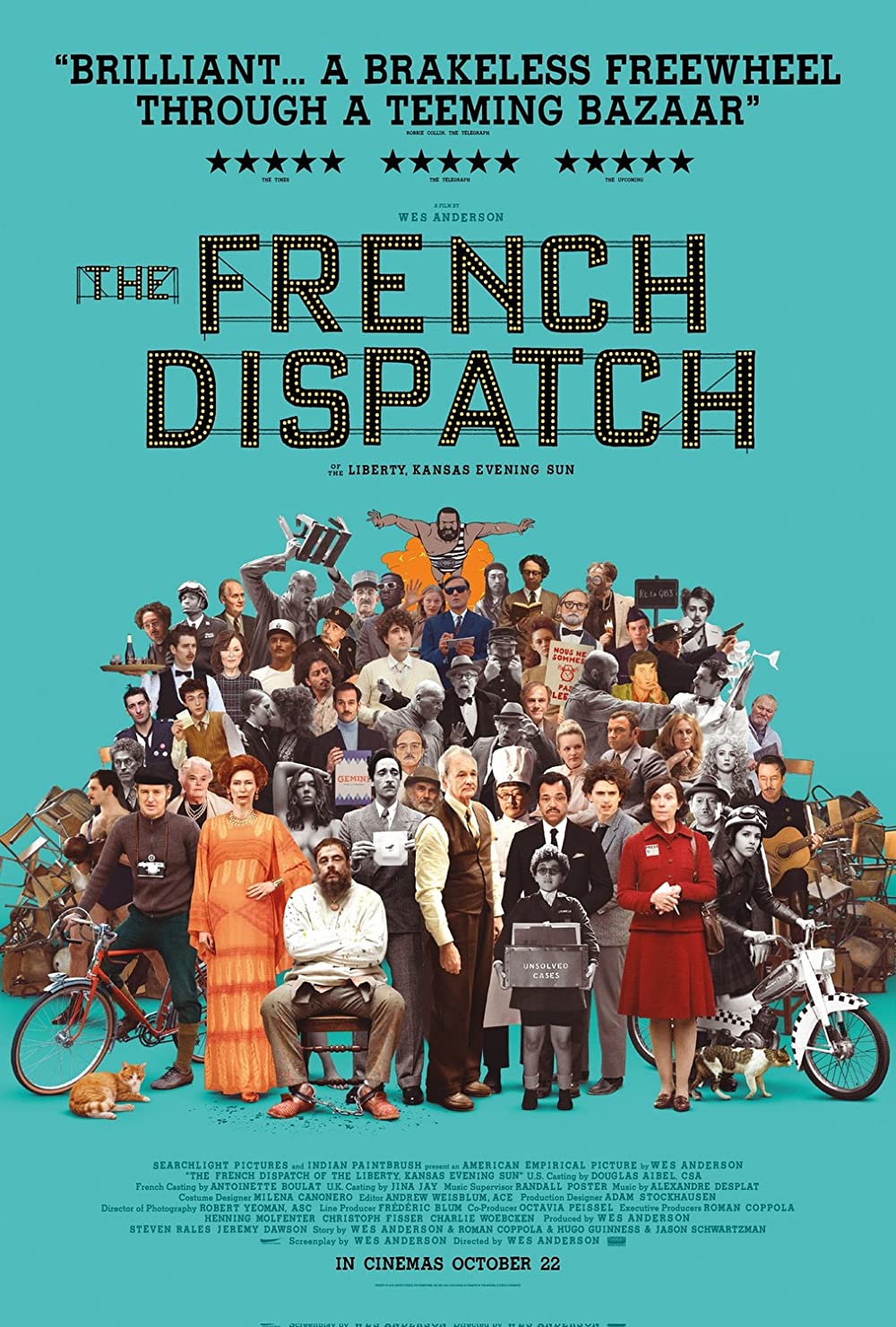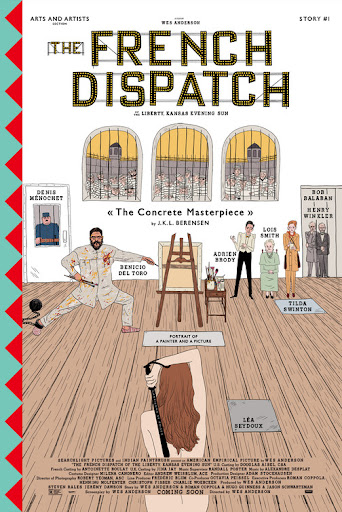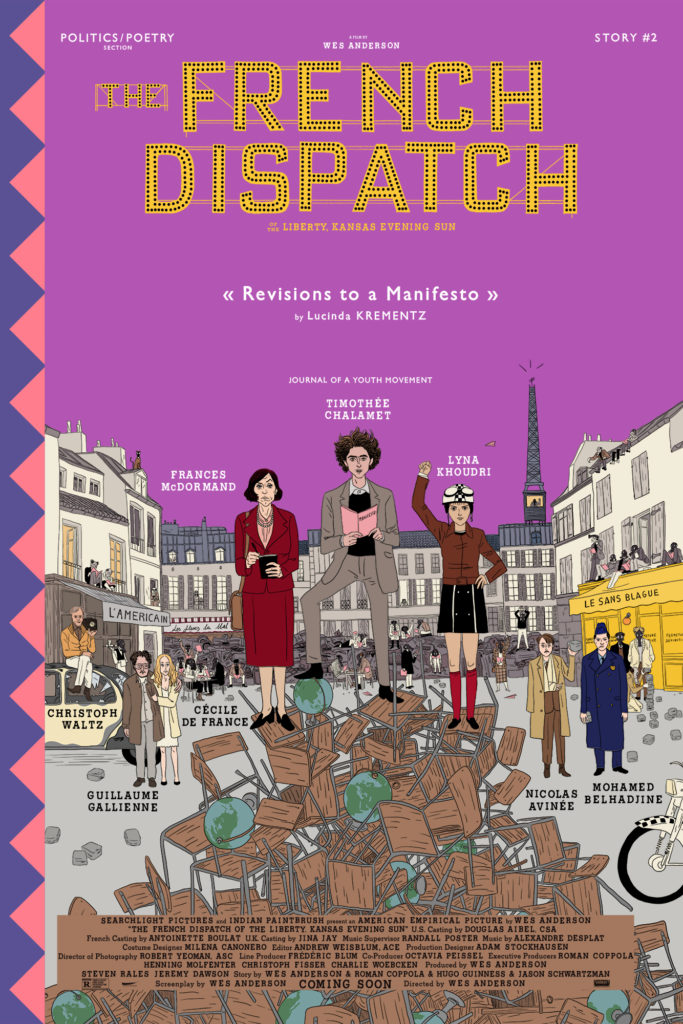
14 Dec The French Dispatch Review
THE FRENCH DISPATCH
dir. Wes Anderson, starring Benicio del Toro, Frances McDormand, Jeffrey Wright, Lea Seydoux, Timothee Chalamet, Bill Murray, et al
The French Dispatch, the tenth film by director Wes Anderson is both his most ambitious and most esoteric to date. Deciding to forego his usual character driven narrative, Anderson compiles a three story anthology that centers on newspaper The French Dispatch in its final issue after its editor Arthur Howitzer Jr. (Bill Murray) dies. The decision is made to run three articles from past editions of the paper, along with Howitzer’s obituary. Thus, the framing device for the movie is laid out as the audience is thrown into the fictional French city of Ennui-sur-Blasé, the location of all three stories. Naming the town Ennui (a feeling of listlessness and dissatisfaction arising from a lack of occupation or excitement) displays Anderson’s humor through irony: featuring prison riots, town rebellions, and protracted shootouts, The French Dispatch does not want for excitement. All three stories are told in the usual Wes Anderson fashion, filling the world with characters both immensely shallow and deceptively complex. His love of journalism as a whole takes center stage throughout the movie, giving each writer their own specific voice and cadence, with each story vastly different than the one preceding it. While some segments work better than others, the approach to the idea and Anderson’s willingness to continue to try new methods of storytelling is what continues to keep his stories fresh and exciting after a quarter century of filmmaking.
THE CYCLING REPORTER
Local Color (pages 3-4)
Prior to the articles proper, writer Herbsaint Sazerac (classic Wes Anderson staple Owen Wilson) delivers a brief introduction to the town of Ennui, the fictional French town that serves as the subject of interest for the remainder of the film. Wilson is standard; much like his previous work with Anderson, he’s solid, dependable, and with barely more than five or six minutes of screentime he delivers his usual charm Anderson fans have come to love. The purpose of the story is to give viewers a sense of setting; Sazerac (a nod to French-Canadian author Jack Kerouac) uses a motif of then-and-now to reveal how little the town has changed over the years.

THE CONCRETE MASTERPIECE
Arts and Artists (pages 5-34)
The first real vignette of the film, and easily the worst of the three, is framed as a lecture being given by French Dispatch writer J.K.L. Berensen (Tilda Swinton). Through this lecture, the audience is introduced to incarcerated artist Moses Rosenthaler (Benicio del Toro), who uses prison guard Simone (Lea Seydoux) as his muse. The theme of art for appreciation versus art for commodity’s sake is the main undertone here; Anderson’s not-so-subtle swipe at those who use art merely for profit is not lost. To this end, art dealer Julien Cadazio acts as Moses’ liaison between jail and the outside world as he brokers a deal for Moses’ next big creation. Benicio del Toro, while an accomplished actor with a number of powerful performances under his belt, is ill suited for the whimsical world of Wes Anderson. That awkward fit comes through especially in del Toro’s delivery; while his character of Moses is seemingly resigned to his fate to die inside the jail for double murder, Moses’ resignation comes across as a disinterested del Toro, sleeping through his lines for a paycheck. Counterbalancing this, Lea Seydoux as the stern muse delivers a performance not unlike what we see from her 007 character Madeline Swan as she’s first introduced in Spectre: cold and detached. The shocking opening shot of a full-frontal naked Lea Seydoux seems an unnecessarily gratuitous move by Anderson, shock for shock’s value. What could’ve been played as suggestive and actually artful is instead subverted as a cheap way to grab the viewer early. Adrien Brody’s performance harkens back to this role in The Darjeeling Limited, ramped up a few notches, while Swinton’s exuberance plays well off del Toro’s laconic delivery, Seydoux’s stiff demeanor, and Brody’s mania. Everything about the character screams boisterous, from her delivery to her clothing, and it’s apparent Swinton had a blast on set. Finally, the slightest of nods can be found to Anderson’s earlier film The Fantastic Mr. Fox for those who can spot it.

REVISIONS TO A MANIFESTO
Politics/Poetry (pages 35-54)
The middle piece of the film, and the one that feels the most Wes Anderson-y of the three, Revisions to a Manifesto features writer Lucinda Krementz (Frances McDormand) as she reports on a student protest in the streets of Ennui. The reason for this protest starts as a small, petty reason for a generation to rebel against their parents, but snowballs into a greater cause. In this piece, Anderson tackles journalistic integrity in writing, and the ability of writers to become too attached to their material. Frances McDormand delivers a great layered performance, managing to appear aloof and detached, while also displaying a great sadness and vulnerability. The vim and vigor of the rebellious youth is fronted by Zeffirelli (Timothée Chalamet, displaying his silliest acting to date), a young man who’s written a manifesto that helps inspire the youth to action. The proxy war, mostly conducted via chess games between Zeffirelli and Ennui’s mayor, is typical Wes Anderson, choosing to bypass actual physical violence (a constant rarity in his films) and instead replace it with something representative. While journalistic integrity is the heart of the story, it also serves as a tongue-in-cheek tale for the older viewers to chuckle and think remember how stupid we were back when we were young? We thought we knew everything.

THE PRIVATE DINING ROOM OF THE POLICE COMMISSIONER
Tastes & Smells (pages 55- 74)
Far and away the best of the three segments (and I suspect Anderson knew as well, which is why it’s presented last), this segment is taken from the Tastes & Smells section of the paper yet framed a bit differently than the first two. Audiences are introduced to Roebuck Wright (Jeffrey Wright), an accomplished writer being interviewed in which he reveals he possesses a typographic memory, meaning he can remember everything he’s written with perfect clarity. Naturally, the interviewer (the smallest bit part, played by Liev Schrieber) decides to test this claim by asking Wright to recite one of his articles. What we’re presented with is Wright’s voiceover narrating the action in which his dinner with a police commissioner (Matthew Almaric) is interrupted by the kidnapping of the commissioner’s son. The commissioner, his retinue to include his trusty cook (Stephen Park), and Wright all strike out to rescue the boy. This is the most dynamic of the three segments, the most action filled, topped with Anderson’s usual flairs and penchant for silliness. Cycling between live action and animated, Wright’s story ends on a tender, quiet moment of bonding between himself and the cook (two immigrants of color) that’s easily the most heartfelt scene of the entire film. Wright’s narration is perfect as he commands the audience with the resonant bass in his voice that’s reminiscent of a kindly old man relaying a story with the humor and fondness of reflecting on years past. Featuring a bevy of talent, to include Edward Norton and Saoirse Ronan, Anderson certainly saved the best for last.
Overall, when taken as a whole and compared against his earlier films, The French Dispatch isn’t Wes Anderson’s strongest work. However, it’s him at his most experimental, which manages to yield delightful results and moments that shine throughout. While not every story fires on all cylinders, Anderson’ love of journalism, of France, and of offbeat characters who could only exist in his fantasy world next door are all apparent and on full display. This is the director at his most creative and daring, using a framing device to tell these outlandish tales in a manner that’s every bit as peculiar as the characters he populates the stories with. Unfortunately, that uniqueness comes at a price; Anderson’s work is already known to play to a very niche crowd and his willingness to push past his own boundaries may alienate some fans. The French Dispatch is a must see for any hardcore fans of the director, while others may want to approach his enigmatic style with caution. The French Dispatch will be available on digital and VOD on December 14th, with a physical release to follow two weeks later on December 28th.
Review by Darryl Mansel


No Comments